Grapes are tasty and sweet, and many farm animals, including cows, would not hesitate to gobble them. If you have a vineyard on your farm, your cows may encounter grapes or their by-products while grazing.
However, are grapes safe for your cows to eat? Should they eat grapes? Keep reading to find out.
Can cows eat grapes?
Yes, cows can safely eat grapes! Grapes are rich in nutrients that cows need to produce quality milk and meat.
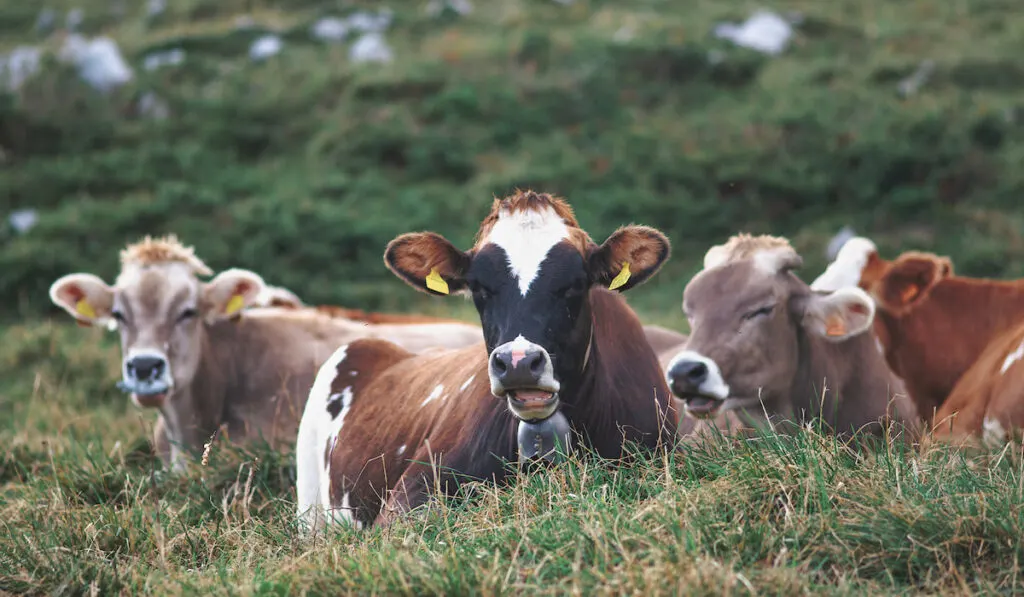
However, cows should only eat grapes in moderation. Excessive grape consumption can cause bloating, leading to severe issues, like diarrhea.
Table of Contents
Why Can Cows Eat Grapes?
Grapes are among many fruits that are safe for cows to eat.
Grapes contain essential vitamins and minerals that cows require for healthy growth. Their nutrients are also vital for quality meat and milk production.
All types of grapes that humans can eat, including green, concord, red, and wild grapes, are edible for cows.
However, remember to only feed your cows grapes in moderation to avoid digestive issues.
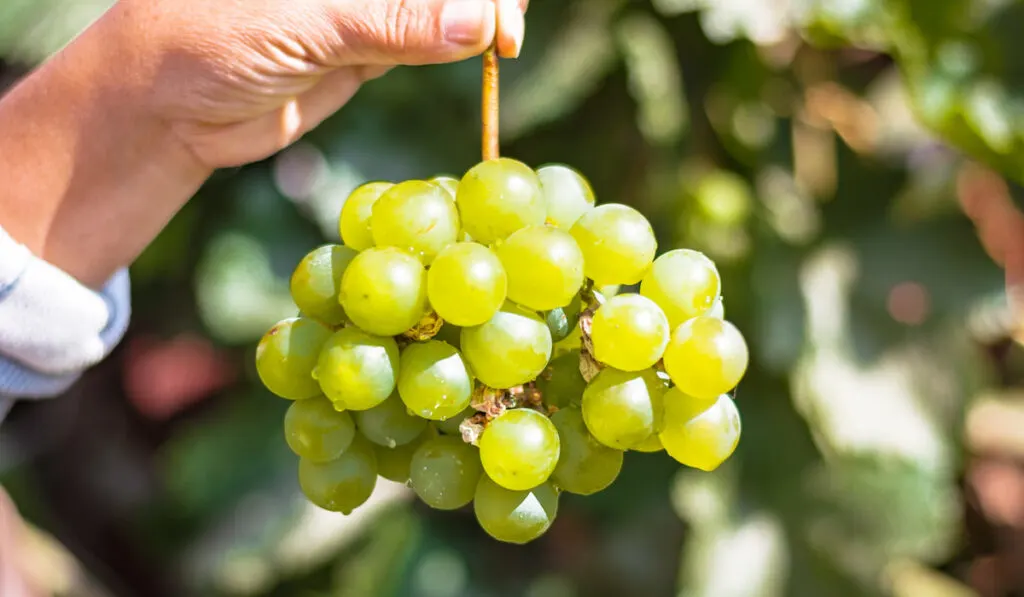
Nutritional Benefits
As mentioned above, although grapes may be very nutritious, limit how many you feed to your cows.
Supplementing your cows’ regular feeds with grape treats will encourage them to eat the vital nutrients they need.
The table below shows the nutritional composition of grapes:
| Nutrient | Quantity (per 100g of red/green grapes) |
| Fiber | 0.9g |
| Proteins | 0.72g |
| Vitamin C | 3.2mg |
| Potassium | 191mg |
| Copper | 0.127mg |
| Manganese | 0.071mg |
| Vitamin K | 14.6µg |
Fiber
Grapes contain insoluble fiber, which is helpful to cows’ digestive systems. Fiber improves rumen health and helps in the digestion of other nutrients.
Protein
Protein is beneficial to cows in many ways. For example, lactating cows require protein for milk production, and calves also need protein for healthy growth and development.
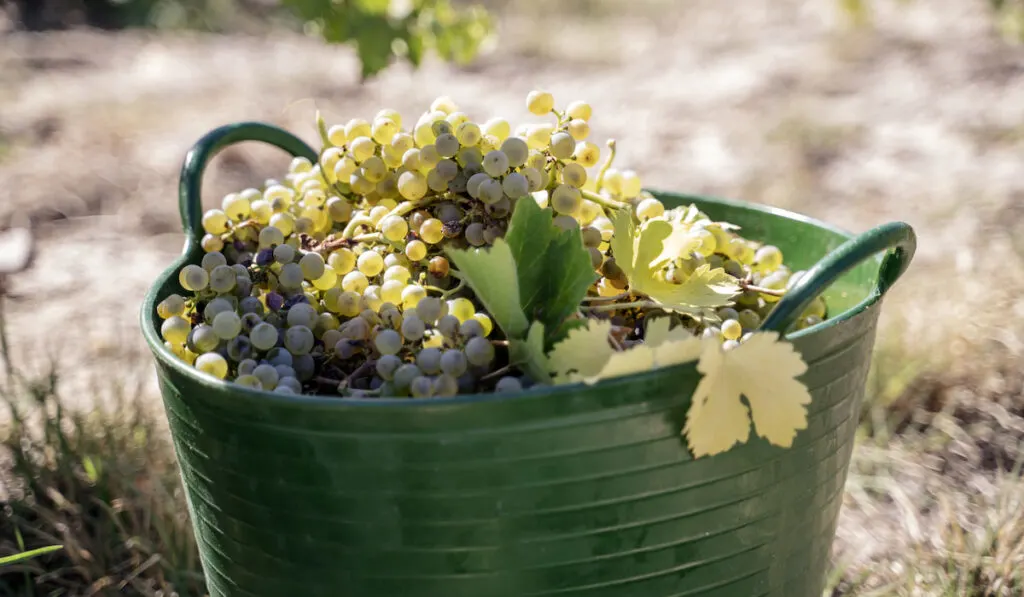
Vitamin C
Vitamin C helps boost the immunity of cattle. It also helps in healing and preventing mastitis in dairy cows.
Potassium
Potassium is an essential nutrient in cows’ diets, as it enhances milk production. Also, potassium helps relieve heat stress during hot weather.
Copper
Copper boosts healthy growth and development of bones and nerve fibers in cattle and sheep. It also enhances wool growth and pigmentation.
Manganese
Manganese acts as a co-factor in energy production and carbohydrate and fat metabolism. Moreover, it facilitates bone development and cartilage formation, ensuring healthy growth.
Vitamin K
Vitamin K is an essential nutrient for livestock, including cattle. It facilitates prothrombin production in the liver, which helps in blood clotting. Insufficient prothrombin causes delayed clotting and can lead to internal bleeding.
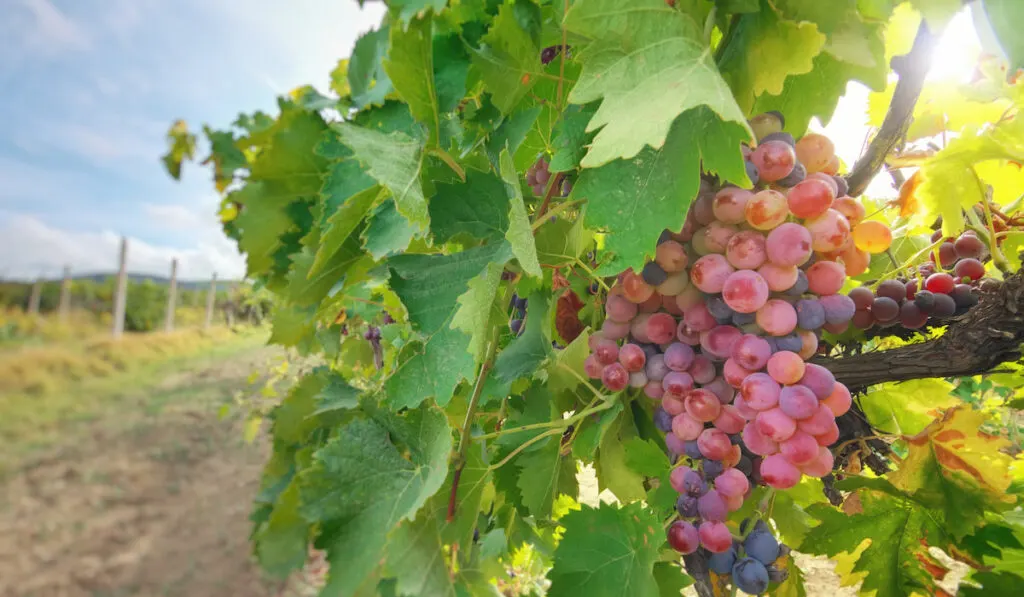
Can Cows Eat Grape Vines and Leaves?
Yes, grape vines and leaves are safe for cows to eat.
Feeding cows grape seeds, skins, and stems can help reduce their methane emissions by up to 20% and increase fatty acid concentration in milk.
Fatty acids are good for heart health and fighting diseases like cancer, arthritis, and diabetes.
How to Prepare the Grapes
Cows can eat grapes in any form. You can mix your grape treats with regular feeds to entice them to eat or feed them the grapes separately.
However, like most fresh fruits, grapes contain pesticide residues. Eating grapes could expose the cows to carcinogenic compounds.
To reduce the risk, wash grapes with clean water before feeding them to your cattle.
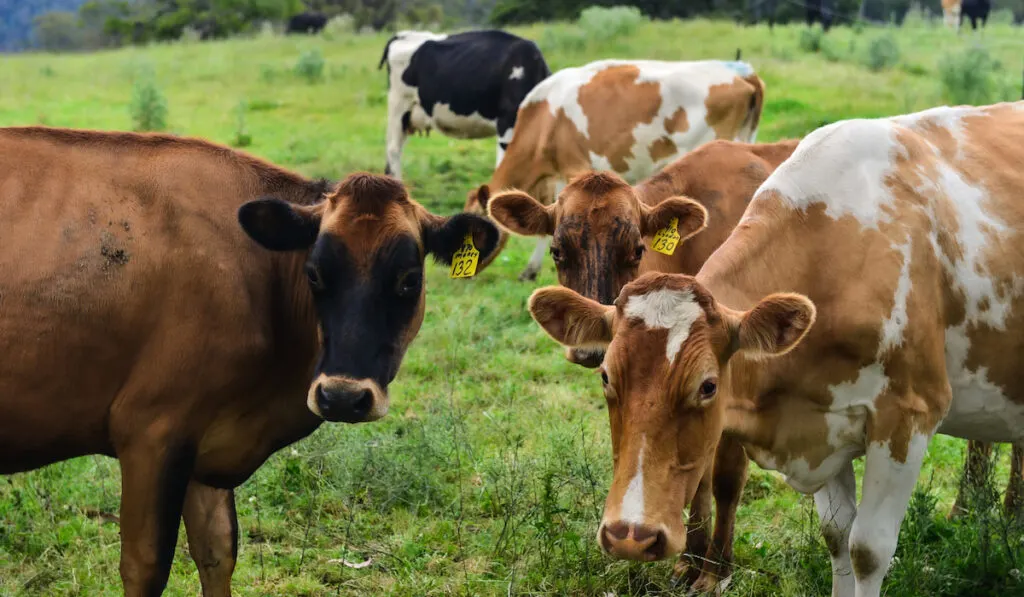
Benefits and Risks
Feeding grapes to your cows has many benefits. However, there are some risks if not done correctly.
Benefits
- Protein-rich milk production
- Improved immunity
- Healthy growth in calves
- Enhanced blood clotting
- Improved wool growth and pigmentation
- Improved metabolism
- Improved rumen health
- Reduced methane emission
Risks
- Bloating in cases of excessive consumption
- Reduced milk yield in dairy cattle
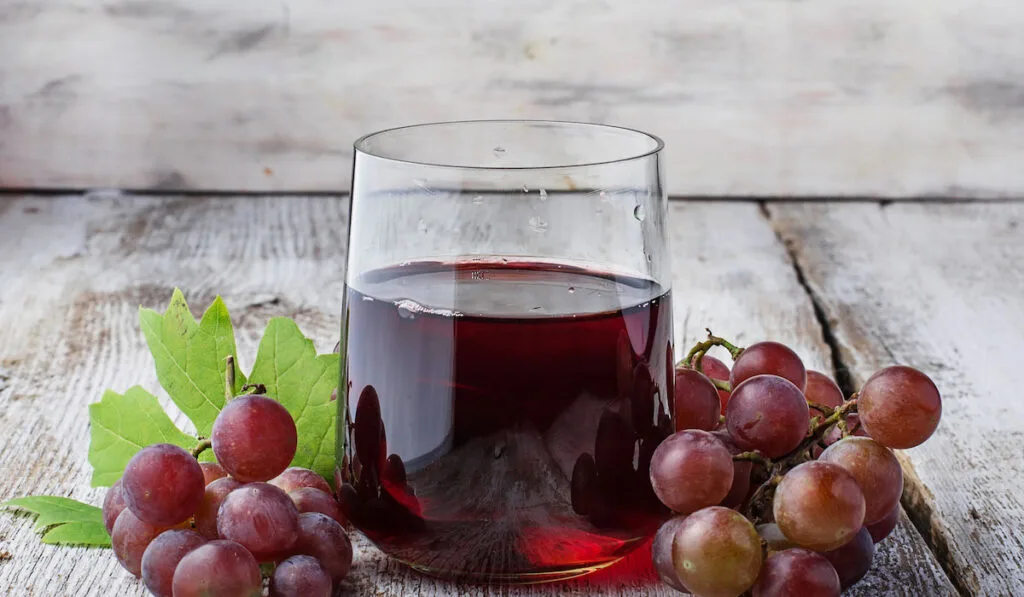
Are Processed Grape Products Suitable for Cows?
You may wonder whether processed grape products are safe for your cows. These include:
- Wine
- Frozen grapes
- Grape juice
- Preserves jams and jellies
- Freeze-dried grapes
Wine
Although it is not a recommended treat, wine is not harmful to cows.
Some reports even indicate that French farmers give their cows wine to improve the taste of the beef.
Frozen Grapes
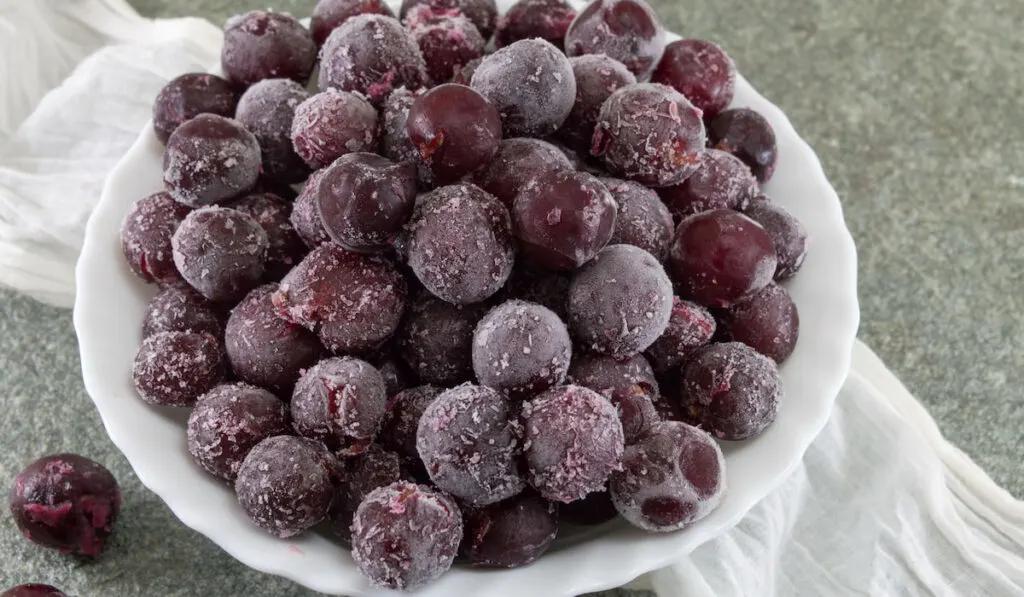
Just like fresh ones, frozen grapes are safe to feed to cows. They can be an ideal treat for a hot summer day.
Grape Juice
Grape juice is also safe for cattle consumption. One study has shown that you can safely include moderate amounts of surplus grape juice in beef cattle feeds.
Grape Preserves, Jams, and Jellies
You can safely give your cows grape preserves, jellies, and jams in moderation as treats. The sweet taste will entice the cows to eat.
However, it is best to always verify the contents of processed products before feeding them to your cattle.
Check the packaging for important information, and consult your vet if you have any questions.
Freeze-Dried Grapes
Freeze-dried grapes and raisins do not lose all their nutritional content. Thus, they are perfect treats for your cows.
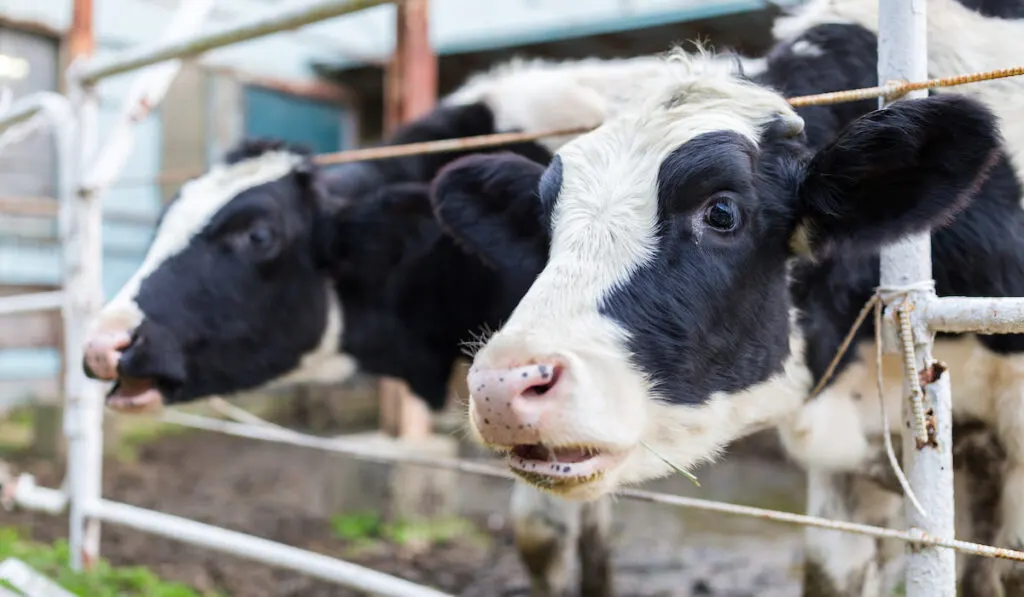
Things to Remember
When feeding grapes and grape products to your cows, it is crucial to remember that this should not be a staple in their diet.
Only feed them grape treats as a supplement to a balanced diet.
Here are some things to keep in mind:
- Overfeeding can cause bloating
- Give only the recommended amounts
- Verify the suitability of processed grape products before feeding to your cows
- Give lower quantities to dairy cattle to avoid a reduction in milk yield
- Don’t let your pets eat the grapes or grape products
Final Thoughts
Grapes contain essential nutrients that cows need for healthy growth and bone formation. Moreover, they also help reduce methane emissions and improve milk quality.
However, excessive quantities can be counterproductive. Therefore, you should feed them to cows in moderation as treats.
It is best to seek your vet’s advice if you need clarification on the amount to give your cows.
Resources
I wrote this article from my experience raising cattle and the following sources:
- https://www.sciencedirect.com/science/article/pii/S002203021200063X
- https://fdc.nal.usda.gov/fdc-app.html#/food-details/174683/nutrients
- https://extension.oregonstate.edu/animals-livestock/beef/guide-protein-nutrition-cattle
- https://www.ncbi.nlm.nih.gov/pmc/articles/PMC4093111
- https://dairy-cattle.extension.org/excess-sulfur-and-potassium-can-cause-mineral-nutrition-problems-with-dairy-cows/
- https://www.agric.wa.gov.au/feeding-nutrition/copper-deficiency-sheep-and-cattle
- https://open.oregonstate.education/animalnutrition/chapter/chapter-16/
- https://www.ema.europa.eu/en/documents/mrl-report/phytomenadione-vitamin-k1-menadione-vitamin-k3-summary-report-committee-veterinary-medicinal_en.pdf
- https://www.sciencedirect.com/science/article/pii/S0022030214004305
- http://npic.orst.edu/faq/fruitwash.html
- https://abcnews.go.com/Health/french-cattle-wine-improve-taste-beef/story?id=16845782
- https://www.sciencedirect.com/science/article/abs/pii/0377840189900138
- https://dairy-cattle.extension.org/excess-sulfur-and-potassium-can-cause-mineral-nutrition-problems-with-dairy-cows/
